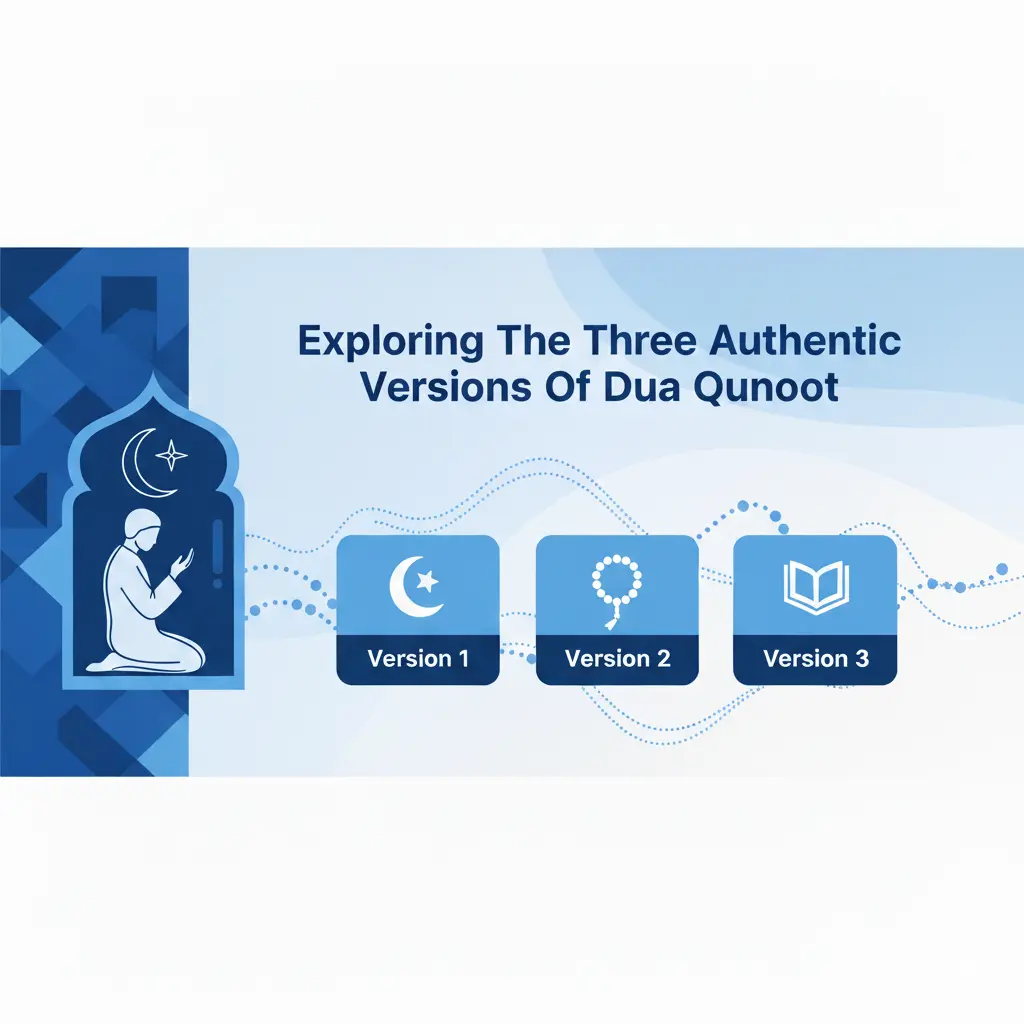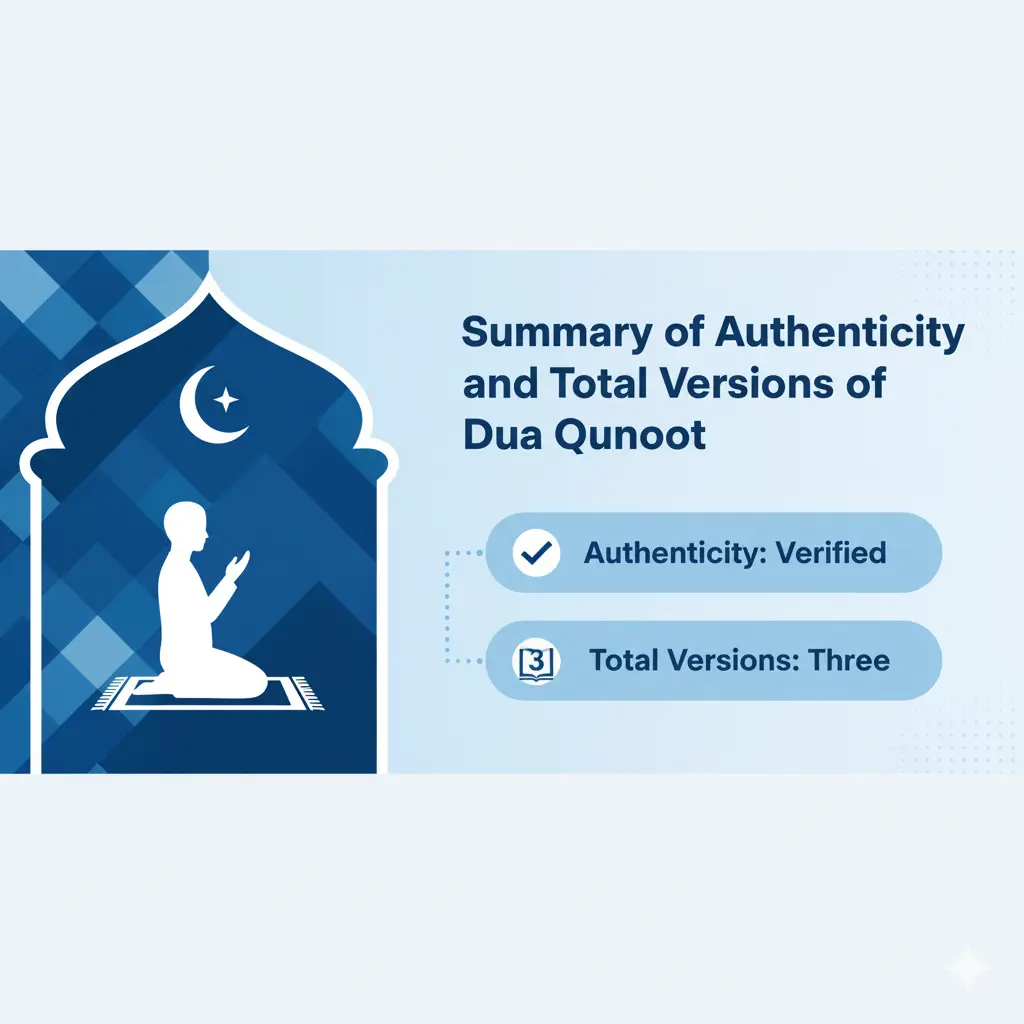Starting With The Name Of Almighty Allah
Many Muslims wonder which dua qunoot is correct to recite in Witr prayer. The short, practical answer is: There is no single exclusive wording imposed on every believer. The Prophet ﷺ and his Companions taught several authentic wordings; scholars accepted a few established texts (with small wording variations) and also permitted making any heartfelt supplication during the Qunoot. In practice, you may recite the well-known prophetic wording narrated to al-Hasan, the fuller wording commonly used in the Shafiʿī tradition, or the versions that Hanafis teach; each is rooted in the Sunna,h and the legal schools explain their preferred times and methods.
What Is Duʿa Al-Qunūt And Why Is It Recited In Witr?
Qunūt (قنوت) in ṣalāh refers to a moment of supplication offered with humility (standing or raised hands in some schools) during particular prayers — most commonly in Witr and sometimes during times of calamity (Qunūt al-Nazilah). It is a way of turning to Allah with direct requests for guidance, protection, forgiveness and blessing at the close of the night prayer. The Qur’an encourages turning to Allah in dua:
“وَقَالَ رَبُّكُمْ ادْعُونِي أَسْتَجِبْ لَكُمْ”
“And your Lord says, ‘Call upon Me; I will respond to you.’” (Q. 40:60).
At its core, Dua Qunoot is a quiet moment of turning to Allah for help and strength, especially during difficult times. Whether you’re just beginning or looking to deepen your understanding, Online Quran Learning makes it easier to grow at your own pace, with flexible lessons that cover both the basics and meaningful supplications.
Exploring The Three Authentic Versions Of Dua Qunoot
In the following, the three main versions of Dua Qunoot commonly recited in Witr prayers, focusing on their authenticity and the specific hadith narrations that support them.

1. Dua Qunoot Narrated by Al-Hasan ibn Ali
This is the most commonly recited version of Dua Qunoot in Witr prayers across various Islamic schools of thought.
Arabic:
اللَّهُمَّ اهْدِنِي فِيمَنْ هَدَيْتَ، وَعَافِنِي فِيمَنْ عَافَيْتَ، وَتَوَلَّنِي فِيمَنْ تَوَلَّيْتَ، وَبَارِكْ لِي فِيمَا أَعْطَيْتَ، وَقِنِي شَرَّ مَا قَضَيْتَ، إِنَّكَ تَقْضِي وَلَا يُقْضَى عَلَيْكَ، إِنَّهُ لَا يَذِلُّ مَنْ وَالَيْتَ، تَبَارَكْتَ رَبَّنَا وَتَعَالَيْتَ
Transliteration:
Allahumma ihdini fiman hadayt, wa ‘afini fiman ‘afayt, wa tawallani fiman tawallayt, wa barik li fima a‘tayt, wa qini sharra ma qadayt, innaka taqdi wa la yuqda ‘alayk, innahu la yadhillu man walayt, tabarakta Rabbana wa ta‘alayt.
Translation:
O Allah, guide me among those You have guided, pardon me among those You have pardoned, be an ally to me among those You are an ally to, and bless for me that which You have bestowed upon me, and save me from the evil of that which You have decreed, for verily You decree [things] and none can decree upon You. Indeed, he is not humiliated whom You have allied with. [Abundantly] blessed are You, O our Lord, and Exalted.
Hadith Narrations:
- Sunan Abu Dawud (Book 8, Hadith 1425): Narrated by Al-Hasan ibn Ali, who said the Prophet (ﷺ) taught him this supplication for Witr.
- Jami‘ al-Tirmidhi (Book 5, Hadith 464): Similar narration, graded as Sahih by Al-Tirmidhi.
- Sunan al-Nasa’i (Book 20, Hadith 1746): Another narration supporting the same wording.
- Sunan Ibn Majah (Book 5, Hadith 1178): Also records this version.
- Musnad Ahmad (Hadith 1723): Another source with slight variations in wording.
Authenticity:
- Sahih (Authentic):
This narration is widely accepted as authentic by hadith scholars, including Al-Albani (in Sahih Abu Dawud and Sahih al-Tirmidhi), Ibn Hajar, and others. The chain of narrators (isnad) is strong, and it is consistently reported across multiple collections.
- Notes:
Minor variations exist (e.g., adding “wa la manja minka illa ilayk” in some narrations), but these are also considered authentic by scholars like Al-Albani in Irwa’ al-Ghalil (2/170).
Usage:
- This is the most commonly recited version in Witr prayers across Hanafi, Shafi‘i, Maliki, and Hanbali madhabs. It is favored for its concise yet comprehensive supplication for guidance, protection, and blessings.
For the readers who want to understand how knowledge is valued in Islam more broadly, see also What the Quran Teaches Us About Acquiring Knowledge.
2. Dua Qunoot Narrated by Ibn Abbas
This version is similar to the first but uses plural pronouns (e.g., “ihdina” instead of “ihdini”) and is often used in congregational prayers.
Arabic:
اللَّهُمَّ اهْدِنَا فِيمَنْ هَدَيْتَ، وَعَافِنَا فِيمَنْ عَافَيْتَ، وَتَوَلَّنَا فِيمَنْ تَوَلَّيْتَ، وَبَارِكْ لَنَا فِيمَا أَعْطَيْتَ، وَقِنَا شَرَّ مَا قَضَيْتَ، إِنَّكَ تَقْضِي وَلَا يُقْضَى عَلَيْكَ، إِنَّهُ لَا يَذِلُّ مَنْ وَالَيْتَ، وَلَا يَعِزُّ مَنْ عَادَيْتَ، تَبَارَكْتَ رَبَّنَا وَتَعَالَيْتَ
Transliteration:
Allahumma ihdina fiman hadayt, wa ‘afina fiman ‘afayt, wa tawallana fiman tawallayt, wa barik lana fima a‘tayt, wa qina sharra ma qadayt, innaka taqdi wa la yuqda ‘alayk, innahu la yadhillu man walayt, wa la ya‘izzu man ‘adayt, tabarakta Rabbana wa ta‘alayt.
Translation:
O Allah, guide us among those You have guided, pardon us among those You have pardoned, be an ally to us among those You are an ally to, and bless for us that which You have bestowed upon us, and save us from the evil of that which You have decreed, for verily You decree [things] and none can decree upon You. Indeed, he is not humiliated whom You have allied with, nor is he honored whom You have opposed. [Abundantly] blessed are You, O our Lord, and Exalted.
Hadith Narrations:
- Sahih Muslim (Book 4, Hadith 771): Narrated by Ibn Abbas, this version is recorded with the plural form, suitable for congregational prayers.
- Sunan Abu Dawud (Book 8, Hadith 1427): A similar narration with minor differences.
- Musnad Ahmad (Hadith 2724): Supports the same wording.
Authenticity:
- Sahih (Authentic):
This narration is graded as Sahih by major hadith scholars due to its presence in Sahih Muslim, one of the two most authentic hadith collections (alongside Sahih al-Bukhari). Al-Albani and others affirm its authenticity in their works.
- Notes:
The plural form (“us” instead of “me”) makes it particularly suitable for congregational prayers, as it reflects the collective supplication of the group. Some narrations include additional phrases like “wa la ya‘izzu man ‘adayt” (as above), which are also authentic.
Usage:
- Common in congregational Witr prayers, especially in Hanafi and some Shafi‘i communities. It is nearly identical to the Hasan ibn Ali version but adapted for group recitation.
3. Dua Qunoot Narrated by Ubayy ibn Ka‘b
This is the version you provided, which is less commonly recited but still authentic.
Arabic:
اَللَّهُمَّ إِنَّا نَسْتَعِينُكَ وَنَسْتَغْفِرُكَ وَنُؤْمِنُ بِكَ وَنَتَوَكَّلُ عَلَيْكَ وَنُثْنِي عَلَيْكَ الْخَيْرَ، وَنَشْكُرُكَ وَلَا نَكْفُرُكَ، وَنَخْلَعُ وَنَتْرُكُ مَنْ يَفْجُرُكَ، اَللَّهُمَّ إِيَّاكَ نَعْبُدُ وَلَكَ نُصَلِّي وَنَسْجُدُ، وَإِلَيْكَ نَسْعَى وَنَحْفِدُ، نَرْجُو رَحْمَتَكَ وَنَخْشَى عَذَابَكَ، إِنَّ عَذَابَكَ الْجِدَّ بِالْكُفَّارِ مُلْحَقٌ
Transliteration:
Allahumma inna nasta‘inuk wa nastaghfiruk wa nu’minu bik wa natawakkalu ‘alayk wa nuthni ‘alayka al-khayr, wa nashkuruk wa la nakfuruk, wa nakhla‘u wa natruku man yafjuruk. Allahumma iyyaka na‘budu wa laka nusalli wa nasjud, wa ilayka nas‘a wa nahfid, narju rahmatak wa nakhsha ‘adhabak, inna ‘adhabaka al-jidda bil-kuffari mulhaq.
Translation:
O Allah, we seek Your help and ask for Your forgiveness, we believe in You and rely on You, and we praise You with all goodness. We are grateful to You and do not deny You. We disavow and abandon those who disobey You. O Allah, You alone we worship, and to You we pray and prostrate, and toward You we strive and hasten. We hope for Your mercy and fear Your punishment. Indeed, Your severe punishment will surely overtake the disbelievers.
Hadith Narrations:
- Sunan Abu Dawud (Book 8, Hadith 1426): Narrated by Ubayy ibn Ka‘b, who said the Prophet (ﷺ) recited this in Witr.
- Sunan Ibn Majah (Book 5, Hadith 1182): Records a similar narration.
- Musnad Ahmad (Hadith 21084): Another source for this version.
- Al-Tabarani’s Al-Mu‘jam al-Kabir: Contains a supporting narration.
Authenticity:
- Hasan (Good):
This narration is generally graded as Hasan by hadith scholars like Al-Albani (in Sahih Abu Dawud and Irwa’ al-Ghalil 2/172). While it is not as strong as the narrations in Sahih Muslim or the Hasan ibn Ali version, it is still considered reliable and acceptable for use in worship.
- Notes:
Some scholars, like Ibn Hajar, note that the chain of narrators for Ubayy ibn Ka‘b’s version has minor weaknesses compared to the other two, but it is strengthened by corroborating narrations. The content aligns with Islamic theology, making it permissible for recitation.
Usage:
- Less common than the other two versions but used in some communities, especially where the practice of Ubayy ibn Ka‘b is followed. It is valid for both individual and congregational Witr prayers.
Summary of Authenticity and Total Versions

- Total Versions:
As stated previously, there are 3–5 distinct authentic versions of Dua Qunoot for Witr, but the three outlined above are the most prominent and widely recognized. The variations beyond these (e.g., minor additions or rephrasings) are often subsumed under these primary narrations.
- Authenticity Overview:
- Hasan ibn Ali version: Sahih (authentic), widely accepted, and most commonly used.
- Ibn Abbas version: Sahih (authentic), used in congregational settings, especially in Hanafi practice.
- Ubayy ibn Ka‘b version: Hasan (good), less common but still valid and authentic.
- Additional Notes:
Other narrations (e.g., from Ali ibn Abi Talib or Anas ibn Malik) exist but are either less common or have weaker chains, as noted by scholars like Al-Albani in Sifat Salat al-Nabi. These are not widely recited and are often considered subsumed under the above versions.
To learn how this connects practically with worship, you may also want to explore How Many Rakats Are in Isha Prayer? Obligatory, Sunnah, & Nafl.
Is Duʿa Al-Qunūt Sunnah Or Wājib/Obligatory?
(Short Explanation Of Madhhab Positions)
- Shafiʿī position:
Witr itself is considered sunnah muʾakkadah (some classify it as highly recommended), and reciting Qunūt in Witr is treated as a recommended Sunnah practice — not juridically wajib. Many Shafiʿī scholars teach reciting the Qunūt (with the fuller wording) in the last rakʿah.
- Hanafi position:
Witr is wājib (obligatory) for Hanafis and the Qunūt (in Witr) is generally treated as an integral part of their Witr method (so they recite the Qunoot as part of completing the wājib prayer). The timing and placement (before or after rukuʿ) are addressed by Hanafi fiqh and classical evidence
So the answer to “Is dua qunoot mandatory in witr?” depends on your madhhab: Hanafis consider Witr (and therefore its Qunūt) obligatory (wājib), while Shafiʿīs treat it as sunnah (recommended), though both honour the practice and accept the prophetic narrations that underlie it. For step-by-step rulings and timing details about Witr Prayers, related guidance is available in How To Pray Witr Salah? When To Perform This Prayer?
When explaining madhhab differences to children, use simple examples and short practice sessions so the idea of placement and wording becomes familiar; many parents find that enrolling their child in Online Quran Classes for Kids ensures these lessons are taught gently with repetition and tutor correction.
Which Dua Qunoot Is Sunnah?
There is authentic hadith evidence that the Prophet ﷺ taught a specific short supplication for Witr (reported to al-Hasan) and companions narrated that wording. Because of this, reciting that authentic prophetic wording is certainly within the sunnah. At the same time, scholars emphasize the permissibility of making any sincere supplication in Qunoot; therefore saying your own duʿā’ — seeking guidance, forgiveness and protection — is valid and praiseworthy.

Hadith (prophetic wording reported):
“Allahumma ihdini fiman hadayta wa ‘aafini fiman ‘aafayt wa tawallani fiman tawallayt wa barik li fima a’tayt wa qini sharra ma qadayt, fa innaka taqdi wa la yuqda ‘alayk, wa innahu la yadhillu man walayt, wa la ya’izzu man ‘adayt, tabarakta rabbana wa ta’alayt’.”
If you prefer hands-on guidance (timing, placement, and sample recitations), a focused Islamic Fiqh Course on prayer jurisprudence will walk you through the exact sequence used by each madhhab and provide practical drills.
Practical Guidance: How To Choose And Apply A Dua Qunoot
- Learn One Authentic Wording First:
Memorize the short prophetic wording (provided above) so you have a trusted duʿā’ to use every night.
- Understand Your School’s Method:
If you follow Hanafi fiqh, recite the Qunūt in the Hanafi manner (as taught by scholars). If you follow Shafiʿī fiqh, follow its recommended placement and wording. If you attend a mosque, follow the Imam’s practice.
- Make It Personal:
After the prescribed wording, add short personal supplications in your own language from the heart — that is entirely acceptable and beloved in duʿā’.
- If You Forget The Wording:
Say whatever sincere duʿā’ you remember; the essence is humility and turning to Allah. Classical scholars stress the spirit over rigid wording.
Alongside Qunūt, another way to strengthen nightly worship is by reflecting on the Benefits Of Surah Mulk Every Muslim Should Know, which highlights spiritual protection before sleep.
Choosing the wording often comes down to what feels most authentic to you and fits comfortably into your routine, so there’s no need to overthink it. If you want more confidence and hands-on guidance, joining Online Quran Classes can make a big difference, especially with live sessions where you can ask questions and learn step by step. For reliable, teacher-led practice that covers wording, meaning, and placement of the Qunūt, explore Najam Academy. These lessons combine tajwīd, fiqh tips, and daily dua practice to build confidence.
Spiritual Meanings Behind The Requests In Duʿa Al-Qunūt

- Guidance (ihdina): asking to belong to those who follow the straight path.
- Aafiyah (well-being): a comprehensive request for health, protection and ease.
- Tawallī (friendship / care): asking Allah to take one into His protection and closeness.
- Barakah: asking Allah to bless what He has given.
- Protection from the evil of what He decrees: a humble recognition of human dependence on God’s mercy.
Scholarly reflections explain these as a compact, profound petition representing what the believer most needs at the close of the night. Discussions remind students of the importance of proper recitation, a point closely tied to Is Tajweed Mandatory in Salah?
A Note For Learners & Teachers
- The dua qunoot has been transmitted in major hadith and fiqh manuals; teachers who memorize and explain its grammar, meaning and placement add real value to students.
- The hanafi/Shafi‘i distinctions arise from classical juristic reasoning and hadith considerations — consult reliable teachers if you need a ruling for your individual circumstances.
- When in doubt about practice, follow a trusted local scholar or a widely recognized fiqh resource. Where the schools differ, each school’s practice is legitimate for its followers.
When sharing these teachings, it’s important to rely on authentic sources and be mindful of the small differences between schools of thought. Rushing through them can easily cause confusion. This is where an Online Quran Academy can be really helpful, as experienced scholars explain these details clearly and show how to apply them in everyday practice.
Balanced Perspective (Traditional And Academic)
Traditional Islamic belief emphasizes the prophetic origins of Duʿa al-Qunūt and preserves specific wordings. The historical and academic approach studies the chains of transmission and explains why multiple versions circulated among the Companions and the legal schools. Both perspectives agree on the spiritual purpose: turning to Allah with humility at the close of night. When jurists differ about obligation or placement, it reflects careful legal reasoning rather than contradiction. Each school preserves a legitimate devotional path.
Final Words:
Make the Duʿa al-Qunūt in Arabic and English feel natural and heartfelt with structured, tutor-led learning. Najam Academy offers expert, affordable lessons that blend tajwīd, focused supplication practice and practical fiqh in interactive sessions designed for steady progress. As a leading Online Quran Academy serving students across the USA and UK (and worldwide), we provide tailored programs for both children and adults. Whether you seek step-by-step coaching for Witr and its supplications or a comprehensive Basics of Islam Course, our patient tutors will help you master correct recitation, understand the meanings, and apply madhhab differences with confidence. Enrol today to deepen and beautify your night prayers.




